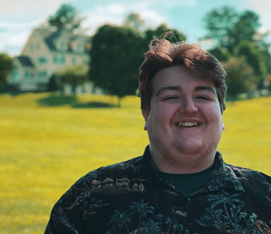Planning for college or training next year? Apply for the Vermont Grant and explore VSAC’s free scholarship booklet to help you cover costs.
David Richardson credits mentors and counselors for his success, and strives to pay it forward

When David Richardson was seven years old, his world turned upside down.
His relatively comfortable middle-class household, supported by two parents who both held good jobs – his mom as a substance use counselor, his dad as a corrections officer – changed, literally, with one wrong step. His father slipped and fell down the stairs at work, broke his back, and was permanently and completely disabled.
And what’s worse, that was just the beginning.
“Around 2010, after he had broken his back, my dad started getting really sick,” David recalls. He suddenly couldn’t keep food down, he lost a lot of weight almost overnight, and he was in and out of the hospital all the time. In 2011, Dartmouth Hitchcock Medical Center finally diagnosed him with severe and chronic pancreatitis, and by that point, he was in desperate need of a pancreatectomy and islet cell transplant – or removal of his pancreas and transplantation of his islet cells, the cells that produce insulin, into his liver. It was a procedure that had never been done before at that hospital.
Fortunately, this part of the story had a happy ending; in the fall of 2012, David’s dad ended up being the first person to have the procedure at Dartmouth Hitchcock, and the surgery was successful. While David’s family was overjoyed that he survived, their stress was far from over; the series of medical setbacks had drained his parents’ savings as well as their earning potential.
“We were a low-income family from then on,” David says.
David’s mom had left her job in 2011, upon her husband’s diagnosis, to become his full-time caregiver. That fall, with the family’s only income coming from his dad’s $900 disability check, the bank foreclosed on their home, and they had to move in with David’s grandfather. In late 2013, thanks to Vermont’s Choices for Care program, which pays family caregivers who provide a nursing-home level of care for their loved ones, David’s family was able to move into their own apartment. While their situation improved, things were still very stressful. David’s dad still spent a lot of time in the hospital – sometimes weeks or months at a time – and financially, they remained a near-poverty family.
“I didn’t fully understand at the time, but I got the sense it wasn’t really normal,” says David, now 20. For him and his older brother Nicco, “it was ‘all hands on deck,’” David recalls, and the anxiety never fully lifted. “You can imagine – you’re worried all the time, will the bills get paid, how will you make the money stretch, and how can you contribute – even if you’re just a kid,” he says.
When it came time for David to apply to college, money was, not surprisingly, a stressor. Thanks to a generous financial aid package and a major award from the Phillips Scholarship Program, David was able to enroll at UVM, where he is now a junior, double-majoring in political science and economics and a member of the Honors College. He gives a lot of credit to the guidance and mentorship he received along the way, and he is already working to pay that forward.
“Even though I was a good student, and I’m very passionate, it was so important for me to have people I could reach out to for help when I was in high school,” says David, who participated in VSAC’s GEAR UP graduation readiness program during his middle and high school years. VSAC partners with GEAR UP, a federal program, to provide college counseling, mentoring and financial support to students who come from modest means, increasing their chances of going on to college. The VSAC Outreach Counselors administer the program in schools across Vermont.
“VSAC was extremely helpful when it came to financial aid and applying for scholarships. I don’t know if I’d be here today without those supports,” he says.
VSAC Outreach Counselor Patricia Turner worked with David for five years. “David was a role model and inspiration to his peers,” she says. “When speaking to the entire class, I often called upon David to comment on the topic at hand. The energy of the room changed when he spoke, as he was speaking as a student leader and peer who was navigating many challenges while propelling his life forward.”
At UVM, David is a newly elected Senator for the Student Government Association, and he is passionate about advocating for low-income and first-gen students at UVM. He is also one of 12 members of VSAC’s GEAR UP Alumni Advisory Committee, which meets regularly to brainstorm possible improvements to the program. David is one of several committee members who are interested in starting an alumni peer mentoring program for VSAC’s GEAR UP students, pairing students with older kids from their region who attend Vermont colleges.
Such a program would be a more formal version of something David has experienced, both as a mentee and, now, as a mentor.
“When I got to UVM, I was sort of adopted by an upperclassman named Cole, who also came from Danville,” David recalls. “So this past year, I decided I wanted to mentor kids from Danville and St. Johnsbury coming to UVM. Because it’s a big change. You go from a school of 400 kids to 13,000, and that first month, especially, can be really tough. It’s easy to feel outnumbered by wealthier students and feel like an impostor. But there are so many great opportunities, and I want to be there so people can come to me if they need help.”
In fact, this spring, on the final day of classes, David returned from class to find three familiar faces standing outside the entrance to his dormitory. Three seniors from Danville High School – all of whom had been accepted to UVM – had come for a campus visit. David welcomed them in, showed them around, and answered their questions – the last of which came as a total surprise. They asked if he would be willing to give the commencement speech at Danville High School.
David accepted the students’ nomination, and when he spoke at graduation – sharing the podium with former Principal David Schilling – he took the opportunity to inspire hope and pride in the hearts of his peers, many of whom came from similarly modest backgrounds.
“I am a product of poverty, and I wear that with great pride. I would not be who I am today, and where I am today, without overcoming what I have,” David shared in the speech.
“I’ve opened up about it over the last few years, not so people will feel bad for me, but because I want to destigmatize that conversation for kids who grow up this way,” David explains. Because no matter where they come from, he says, “kids are still really passionate about their future and about what they want to do, but it can be hard to find the support to get there. Having a safety net there, like I had, to be able to further your life is really important.”





